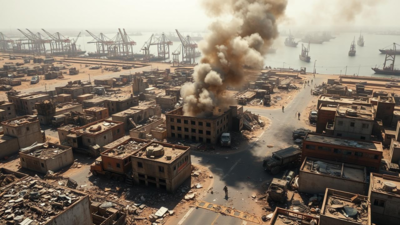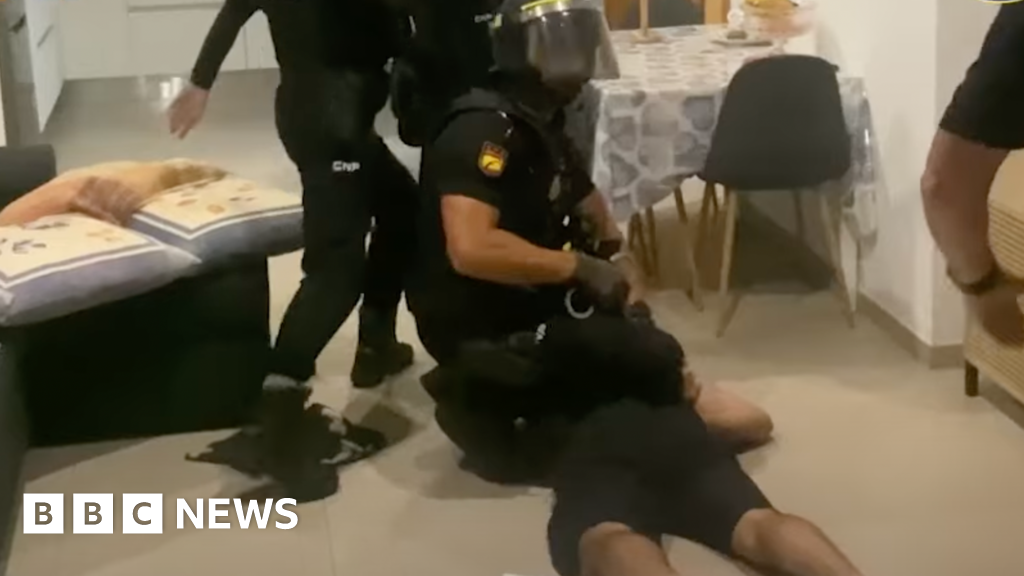
Representative Image (AI-generated)
Paramilitary drone strikes targeting Sudan's wartime capital have sought to shatter the regular army's sense of security and open a dangerous new chapter in the war, experts say.Since April 2023, the Rapid Support Forces (RSF) group has been at war with the army, which has lately recaptured some territory and dislodged the paramilitaries from the capital Khartoum.The latter appeared to have the upper hand before Sunday, when drone strikes began blasting key infrastructure in Port Sudan, seat of the army-backed government on the Red Sea coast.With daily strikes on the city since then, the RSF has sought to demonstrate its strength, discredit the army, disrupt its supply lines and project an air of legitimacy, experts believe.
According to Sudanese analyst Kholood Khair, "this is intended to undermine the army's ability to provide safety and security in areas they control", allowing the RSF to expand the war "without physically being there".For two years, the paramilitaries relied mainly on lightning ground offensives, overwhelming army defences in brutal campaigns of conquest.But after losing nearly all of Khartoum in March, the RSF has increasingly turned to long-range air power.
Using weapons the army says were supplied by the United Arab Emirates, it has hit strategic sites hundreds of kilometres (miles) away from their holdout positions on the capital's outskirts.Michael Jones, research fellow at the Royal United Services Institute in London, says the RSF's pivot is a matter of both "strategic adaptation" and "if not desperation, then necessity".
Strategic setback:
"The loss of Khartoum was both a strategic and symbolic setback," he told AFP.In response, the RSF needed to broadcast a "message that the war isn't over", according to Sudanese analyst Hamid Khalafallah.The conflict between Sudan's de facto leader, army chief Abdel Fattah al-Burhan and his former deputy, RSF commander Mohamed Hamdan Daglo, has split Africa's third-largest country in two.The army holds the centre, north and east, while the RSF controls nearly all of the vast western region of Darfur and, with its allies, parts of the south."It's unlikely that the RSF can retake Khartoum or reach Port Sudan by land, but drones enable them to create a sense of fear and destabilise cities" formerly considered safe, Khalafallah told AFP.With drones and light munitions, it can "reach areas it hasn't previously infiltrated successfully", Jones said.According to a retired Sudanese general, the RSF has been known to use two types of drone -- makeshift lightweight models with 120mm mortar rounds that explode on impact, and long-range drones capable of delivering guided missiles, including the Chinese-manufactured CH95.On Thursday, rights group Amnesty International published a report that said "Chinese GB50A guided bombs and 155mm AH-4 howitzers" used by the RSF in Khartoum and Darfur were provided by the UAE.
Sparing fighters:
The Sudanese government severed diplomatic ties with the Gulf state on Tuesday, accusing it of supplying the advanced weapons systems the RSF has used to attack Port Sudan.Abu Dhabi has repeatedly denied arming the RSF, despite reports from UN experts, US politicians and international organisations.According to Mohaned Elnour, nonresident fellow at the Tahrir Institute for Middle East Policy, the RSF's "main objective is to divert the army's attention" and position itself as a potential government, which it has said it will form."It's much easier for them to attack quickly and withdraw, rather than defend territory," Elnour said.Crossing Sudan's vast landmass -- some 1,500 kilometres (930 miles) from RSF bases in Darfur to Port Sudan -- requires long-range drones such as the Chinese-made Wing Loong II, deployed by the UAE, or the Turkish-made Bayraktar TB2 used by the army, according to Amnesty.Both sides in Sudan are in a race to "destroy each other's drone capacity", Khair said.Two years into the devastating war, the RSF has another incentive to rely on drones, she said."It allows them to spare their troops" after reports that RSF recruitment has dipped since the war began."Initial recruitment was high based on the opportunity to loot, and there's very little left to loot now," she said.Both sides have been accused of war crimes including targeting civilians, but the RSF is specifically accused of rampant looting, ethnic cleansing and systematic sexual violence.

 4 weeks ago
13
4 weeks ago
13










 English (US) ·
English (US) ·